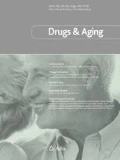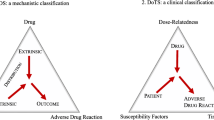Abstract
Adverse drug reactions (ADRs) in older adults are an important healthcare problem since they are frequently a cause of hospitalization, occur commonly during admission, and are an important cause of morbidity and mortality. Older adults are particularly susceptible to ADRs because they are usually on multiple drug regimens and because age is associated with changes in pharmacokinetics and pharmacodynamics.
The presentation of an ADR in older adults is often atypical, which further complicates its recognition. One potential strategy for improving recognition of ADRs is to identify those patients who are at risk of an ADR. The recently developed GerontoNet ADR Risk Score is a practical tool for identification of older patients who are at increased risk for an ADR and who may represent a target for interventions aimed at reducing ADRs.
Provision of adequate education in the domain of clinical geriatric pharmacology can improve recognition of ADRs. Besides formal surveillance systems, built-in computer programs with electronic prescribing databases and clinical pharmacist involvement in patient care within multidisciplinary geriatric teams might help to minimize the occurrence of ADRs. In addition, a number of actions can be taken in hospitals to stimulate appropriate prescribing and to assure adequate communication between primary and hospital care. In older adults with complex medical problems and needs, a global evaluation obtained through a comprehensive geriatric assessment may be helpful in simplifying drug prescription and prioritizing pharmacological and healthcare needs, resulting in an improvement in quality of prescribing.


Similar content being viewed by others
References
World Health Organization. International drug monitoring: the role of the hospital. World Health Organ Tech Rep 1969; 425: 5–24
Mannesse C, Derkx F, de Ridder M, et al. Contribution of adverse drug reactions to hospital admission of older patients. Age Ageing 2000; 29: 35–9
Lazarou J, Pomeranz B, Corey P. Incidence of adverse drug reactions in hospitalized patients: a meta-analysis of prospective studies. JAMA 1998; 279: 1200–5
Cresswell K, Fernando B, McKinstry B, et al. Adverse drug events in the elderly. Br Med Bull 2007; 83: 259–74
Somers A, Petrovic M, Robays H, et al. Reporting adverse drug reactions on a geriatric ward: a pilot project. Eur J Clin Pharmacol 2003; 58: 707–14
Routledge P, O’Mahony M, Woodhouse K. Adverse drug reactions in elderly patients. Br J Clin Pharmacol 2003; 57: 121–6
O’Mahony MS, Woodhouse KW. Age, environmental factors and drug metabolism. Pharmacol Ther 1994; 61: 279–87
Turnheim K. When drug therapy gets old: pharmacokinetics and pharmacodynamics in the elderly. Exp Gerontol 2003; 38: 843–53
Leendertse A, Egberts A, Stoker L, et al., HARM Study Group. Frequency of and risk factors for preventable medication-related hospital admissions in the Netherlands. Arch Intern Med 2008; 168: 1890–6
Beijer H, de Blaey C. Hospitalisations caused by adverse drug reactions (ADR): a meta-analysis of observational studies. Pharm World Sci 2002; 24: 46–54
Gray S, Sager M, Lestico M, et al. Adverse drug events in hospitalized elderly. J Gerontol A Biol Sci Med Sci 1998; 53: M59–63
Pirmohamed M, James S, Meakin S, et al. Adverse drug reactions as cause of admission to hospital: prospective analysis of 18 820 patients. BMJ 2004; 329: 15–9
Ray W, Griffin M, Shorr R. Adverse drug reactions and the elderly. Health Affairs 1990; 9: 114–22
Rawlins M, Thompson J. Pathogenesis of adverse drug reactions. In: Davies D, editor. Textbook of adverse drug reactions. 2nd ed. Oxford: Oxford University Press, 1981: 11
Edwards R, Aronson J. Adverse drug reactions: definitions, diagnosis, and management. Lancet 2000; 356: 1255–9
Wang L. Epidemiology and prevention of adverse drug reactions in the elderly. J Geriatr Cardiol 2005; 2: 248–53
Rawlins M, Thompson J. Pathogenesis of adverse drug reactions. In: Davies D, editor. Textbook of adverse drug reactions. Oxford: Oxford University Press, 1977: 44
Aronson J. Adverse drug reactions: no farewell to harms. Br J Clin Pharmacol 2007; 63: 131–5
Laroche ML, Charmes JP, Marcheix A, et al. Problems encountered with the evaluation of renal function in the elderly in order to adjust drug administration. Pharmacotherapy 2006; 26: 1041–6
Page R, Linnebur S, Bryant L, et al. Inappropriate prescribing in the hospitalized elderly patient: defining the problem, evaluation tools, and possible solutions. Clin Interv Aging 2010; 5: 75–87
Kinirons MT, Crome P. Clinical pharmacokinetic considerations in the elderly: an update. Clin Pharmacokinet 1997; 33: 302–12
Mayersohn M. Pharmacokinetics in the Elderly. Environ Health Perspect 1994; 102 Suppl. 11: 119–24
Klotz U, Avant G, Hoyumpa A, et al. The effects of age and liver disease on the disposition and elimination of diazepam in adult man. J Clin Invest 1975; 55: 347–59
Swift C. Pharmacodynamics: changes in homeostatic mechanisms, receptor and target organ sensitivity in the elderly. Br Med Bull 1990; 40: 36–52
Gurwitz JH, Avorn J. The ambiguous relation between aging and adverse drug reactions. Ann Intern Med 1991; 114: 956–66
Stewart R, Cooper J. Polypharmacy in the aged. Practical solutions. Drugs Aging 1994; 4: 449–61
Hajjar E, Cafiero A, Hanlon J. Polypharmacy in elderly patients. Am J Geriatr Pharmacother 2007; 5: 314–6
Goldberg R, Mabee J, Chan L, et al. Drug-drug and drug-disease interactions in the ED: analysis of a high-risk population. Am J Emerg Med 1996; 14: 447–50
Col N, Fanale JE, Kronholm P. The role of medication non-compliance and adverse drug reactions in hospitalizations of the elderly. Arch Intern Med 1990; 150: 841–5
Barat I, Andreasen F, Damsgaard EM. Drug therapy in the elderly: what doctors believe and patients actually do. Br J Clin Pharmacol 2001; 51: 615–22
Lindley C, Tully M, Paramsothy V, et al. Inappropriate medication is a major cause of adverse drug reactions in elderly patients. Age Ageing 1992; 21: 294–300
Klarin I, Wimo A, Fastbom J. The association of inappropriate drug use with hospitalisation and mortality: a population-based study of the very old. Drugs Aging 2005; 22: 69–82
Beers MH, Ouslander JG, Rollingher I, et al. Explicit criteria for determining inappropriate medication use in nursing home residents. Arch Intern Med 1991; 151: 1825–32
Naugler CT, Brymer C, Stolee P, et al. Development and validation of an improving prescribing in the elderly tool. Can J Clin Pharmacol 2000; 7: 103–7
Gallagher P, O’Mahony D. STOPP (Screening Tool of Older Persons’ potentially inappropriate Prescriptions): application to acutely ill elderly patients and comparison with Beers’ criteria. Age Ageing 2008; 37: 673–9
Hanlon JT, Schmader KE, Samsa GP, et al. A method for assessing drug therapy appropriateness. J Clin Epidemiol 1992; 45: 1045–51
Rochon P, Gurwitz J. Optimising drug treatment for elderly people: the prescribing cascade. BMJ 1997; 315: 1096–9
Woolcott J, Richardson K, Wiens M, et al. Meta-analysis of the impact of 9 medication classes on falls in elderly persons. Arch Intern Med 2009; 169: 1952–60
Agbabiaka TB, Savovic J, Ernst E. Methods for causality assessment of adverse drug reactions: a systematic review. Drug Saf 2008; 31: 21–37
Naranjo CA, Busto U, Sellers EM, et al. A method for estimating the probability of adverse drug reactions. Clin Pharmacol Ther 1981; 30: 239–45
World Health Organization-Uppsala Monitoring Centre (WHO-UMC). The use of the WHO-UMC system for standardised case causality assessment. Uppsala: The Uppsala Monitoring Centre [online]. Available from URL: http://who-umc.org/Graphics/24734.pdf [Accessed 2012 Mar 19]
Shenfield G, Robb T, Duguid M. Recording previous adverse drug reactions: a gap in the system. Br J Clin Pharmacol 2001; 5: 623–6
Onder G, Pedone C, Landi F, et al. Adverse drug reactions as cause of hospital admissions: results from the Italian Group of Pharmacoepidemiology in the Elderly (GIFA). J Am Geriatr Soc 2002; 50: 1962–8
Spinewine A, Schmader KE, Barber N, et al. Appropriate prescribing in elderly people: how well can it be measured and optimised? Lancet 2007; 370: 173–84
Onder G, Petrovic M, Tangiisuran B, et al. Development and validation of a score to assess risk of adverse drug reactions among in-hospital patients 65 years or older: the GerontoNet ADR Risk Score. Arch Intern Med 2010; 170: 1142–8
Gurwitz J, Field T, Harrold L, et al. Incidence and preventability of adverse drug events among older persons in the ambulatory setting. JAMA 2003; 289: 1107–16
Field T, Gurwitz J, Avorn J, et al. Risk factors for adverse drug events among nursing home residents. Arch Intern Med 2001; 161: 1629–34
Onder G, Landi F, Della Vedova C, et al.; GIFA Study. Moderate alcohol consumption and adverse drug reactions among older adults. Pharmacoepidemiol Drug Saf 2002; 1: 385–92
Bates D, Miller E, Cullen D, et al., ADE Prevention Study Group. Patient risk factors for adverse drug events in hospitalized patients. Arch Intern Med 1999; 159: 2553–60
Gurwitz JH, Rochon P. Improving the quality of medication use in elderly patients: a not-so-simple prescription. Arch Intern Med 2002; 162: 1670–2
McDowell S, Coleman J, Ferner R. Systematic review and meta-analysis of ethnic differences in risks of adverse reactions to drugs used in cardiovascular medicine. BMJ 2006; 332: 1177–81
Zeeh J, Platt D. The aging liver: structural and functional changes and their consequences for drug treatment in old age. Gerontology 2002; 48: 121–7
Catananti C, Liperoti R, Settanni S, et al. Heart failure and adverse drug reactions among hospitalized older adults. Clin Pharmacol Ther 2009; 86: 307–10
Routledge P, O’Mahony M, Woodhouse K. Adverse drug reactions in elderly patients. Br J Clin Pharmacol 2004; 57: 121–6
Laroche M, Charmes J, Nouaille Y, et al. Is inappropriate medication use a major cause of adverse drug reactions in the elderly? Br J Clin Pharmacol 2006; 63: 177–86
Laroche M, Charmes J, Marcheix A, et al. Estimation of glomerular filtration rate in the elderly: Cockcroft-Gault formula versus modification of diet in renal disease formula. Pharmacotherapy 2006; 26: 1041–6
Merle L, Laroche M, Dantoine T, et al. Predicting and preventing adverse drug reactions in the very old. Drugs Aging 2005; 22: 375–92
Gillespie U, Alassaad A, Henrohn D, et al. A comprehensive pharmacist intervention to reduce morbidity in patients 80 years or older: a randomized controlled trial. Arch Intern Med 2009; 169: 894–900
Somers A, Robays H, Vander Stichele R, et al. Contribution of drug related problems to hospital admission in the elderly. J Nutr Health Aging 2010; 14: 477–82
Fusco D, Lattanzio F, Tosato M, et al. Development of CRIteria to assess appropriate Medication use among Elderly complex patients (CRIME) project: rationale and methodology. Drugs Aging 2009; 26 Suppl. 1: 3–13
Boyd CM, Darer J, Boult C, et al. Clinical practice guidelines and quality of care for older patients with multiple comorbid diseases: implications for pay for performance. JAMA 2005; 294: 716–24
Abellan van Kan G, Rolland Y, Houles M, et al. The assessment of frailty in older adults. Clin Geriatr Med 2010; 26: 275–86
Ellis G, Whitehead MA, O’Neill D, et al. Comprehensive geriatric assessment for older adults admitted to hospital. Cochrane Database Syst Rev 2011; 7: CD006211
Onder G, Lattanzio F, Battaglia M, et al. The risk of adverse drug reactions in older patients: beyond drug metabolism. Curr Drug Metab 2011; 12: 647–51
Lampela P, Hartikainen S, Lavikainen P, et al. Effects of medication assessment as part of a comprehensive geriatric assessment on drug use over a 1-year period: a population-based intervention study. Drugs Aging 2010; 27: 507–21
Schmader KE, Hanlon JT, Pieper CF, et al. Effects of geriatric evaluation and management on adverse drug reactions and suboptimal prescribing in the frail elderly. Am J Med 2004; 116: 394–401
Acknowledgements
No sources of funding were used to assist in the preparation of this article. The authors have no conflicts of interest that are directly relevant to the content of this article.
Author information
Authors and Affiliations
Corresponding author
Rights and permissions
About this article
Cite this article
Petrovic, M., van der Cammen, T. & Onder, G. Adverse Drug Reactions in Older People. Drugs Aging 29, 453–462 (2012). https://doi.org/10.2165/11631760-000000000-00000
Published:
Issue Date:
DOI: https://doi.org/10.2165/11631760-000000000-00000




